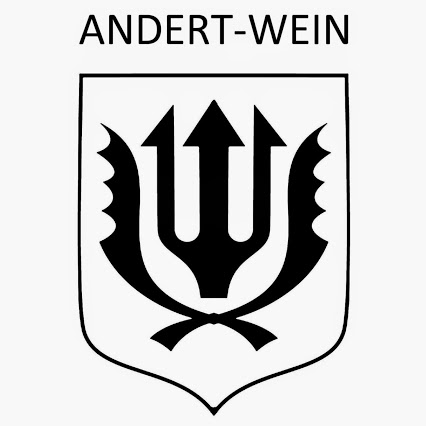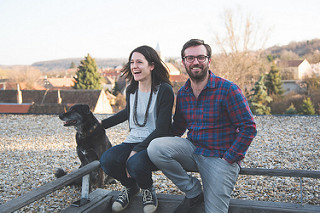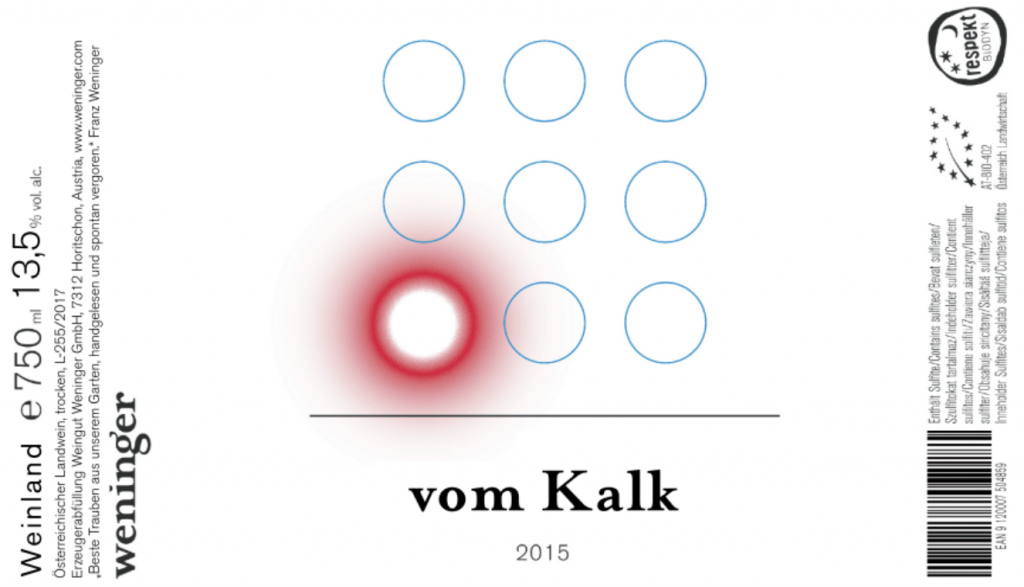Read Part One of our tour of Burgenland, Austria, where we cover the history, terroirs, typical grapes grown and grower Judith Beck!

Michael Andert
Michael Andert was born into a large family and grew up on a farm with mixed agriculture, livestock and viticulture and learned to respect his family, his animals and the associated work. Today, as winemaker, this respect has deepened even more.
We think we found the right way in the biodynamic economy to press the grapes into sustainable and valuable wines. We respect the earthly and cosmic influences on our wines, our soil and also we respect the influence of the seasons on our wines.

We were taken to the small plot of vines that comprise the Gemischter Sotz, a field blend of various white grapes. The location of the vineyard is in itself unremarkable, being a flat piece of land that was once under water (the marshes around here were drained some time ago) although some of the boggy, low-lying areas still host an extraordinary variety of birds. This small vineyard is humming with life. They have installed a box in a lone tree at one end of the row of vines for falcons to nest in. Herbs and grasses grow bountifully– spring onions, wild garlic, oregano and countless other herbs, edible (as it turns out) flowers and weeds. Michael stops and stoops occasionally plucking a plant and enjoins me to nibble this flower or that leaf. Whether it is the effect of the sun beating down and the earth warming up but even the bitter leaves taste nourishing. Pesky deer are kept away by the old-fashioned expedient of a wild boar’s hide draped over the wires. A flock of mixed sheep (including a rare local breed) are grazing in neighbouring pasture, whilst cockerels, guinea fowls, ducks and geese gabble loquaciously in the adjacent pen.
Michael repairs into a hut and brings out a loaf of sourdough bread – baked by his neighbour – a water buffalo wurst and some homemade wild boar prosciutto and we have an impromptu picnic of meat, herbs and edible flowers washed down with chilled Zweigelt. Of course, it is the most delicious thing imaginable. Even more seductive is the golden wine he then pours that comes from the melange of grapes in the very vineyard where we are noshing and sloshing.
This is biodynamics felt in the heart and practised with the head. Michael and Erich have noticed a palpable improvement in the wines since they have moved to this type of farming: The wines are gaining individuality and have more character. Also they are more digestible and more stable. Due to the aging in oak barrels in our cellar, the complexity of the wines is underlined, which ensures a long shelf life.
Talking to all the growers it’s clear that they view treating the vineyard as a living organism as well as working without chemicals or additives in the winery as a prerequisite for making quality wine. There is a certain Occam’s razor logic to this approach –that by not over-complicating procedures you arrive naturally at a truth-in-wine. Biodynamics is predicated on observing and responding to the needs of the vineyard rather than following a prescriptive course of action. Working responsively in the vines tends to be mirrored in the actions in the winery. Knowing what you have (in the quality of grapes) means that you tend to do what you feel is right. It is not pure science – there is intuition, gut instinct, feel and taste.
The Andert barrel cellar is a no-tech affair. There is no electricity, so tasting is done by candle light. You could put the “bottling line” in your back pocket. These are not technical wines. I was very much taken with the whites.

Gemischter Sotz is a melange of co-fermented Neuburger, Grüner Veltliner, Malvazia, Muskat Ottonel, Sylvaner. It’s fresh and aromatic with a friendly streak of acidity. The Pamhogna white is 70% Rulander (Pinot Gris), 25% Neuberger and 5% Weissburgunder. This wine has an intense golden-yellow colour and a lovely herbal fragrance. It requires carafeing before all the elements harmonise – from the exotic white pear and pineapple fruit aromas to the refreshing acid and fine structure conferred by a gentle clasp of tannin.
The Rulander takes us to Princic country, possessing an exquisite salmon colour with amber highlights. The nose is (sweet)meaty and a little bit smoky, the palate is smooth and almost velvety with suggestions of pink grapefruit, yet also salty with a bitter almond note on the finish.
There is also a rich amber-hued Gruner Veltliner called Anadjuka and a mysterious skin-contact number called PM (Penetranter Mistkerl) or Petit Manseng. Both glorious, opulent natural wines that hum with energy.

Weingut Franz Weninger
Just as each wine grower is a unique individual, so too are their vineyards. Franz Weninger insists on expressing the different soil types found throughout Burgenland and uses Blaufrankisch as the vehicle with which to achieve this. To do this most effectively it is vitally important to encourage biodiversity, and to work organically and also biodynamically, so that the vineyards can realise their maximum potential.
Franz’s vines are planted on a mixture of loam, slate, mica and limestone in different parts of the Mittelburgenland. He views the soil as the origin, the fermentation the birth, and the ageing in the cellar as the “education” of the wines.
The Pannonian climate determines the nature of the growing season. The Neusiedlersee to the east brings warmth; the Bucklige Welt to the west brings cool temperatures. The Illyrian climate sometimes sends in storms from the south. The Sopron Mountains in the north and the Koszeg Mountains in the south provide protection. But this is generally a warm region, propitious for red grape varieties. But Franz is looking for balance rather than extraction – which brings us back to the farming.
Holistic growth and vines in harmony with nature are the goals; organic-biodynamic cultivation is the method. The biological activity of the soil (micro- and macro-organisms) brings the wine’s provenance to the glass. The need for cellar work is minimised because everything is already in balance.
All vineyard work is adapted to the plant with respect to the rhythm of the seasons and the moon. Protecting the natural balance in the vineyard, with the aid of biodynamic preparations and the use of homeopathic teas, enables the Weninger to harvest healthy and vibrant grapes. (The horsetail and nettle are collected in the immediate surroundings of the vineyards).
The south-facing vineyard for the Vom Kalk is in Ritzing, Mittelburgenland, a field blend comprising Merlot, Cabernet Sauvignon, Sankt Laurent. As the name suggests this is all about the signature of the chalk/limestone soils on the wine.
After a manual harvest the grapes are destemmed and fermented with ambient yeasts in cement tanks. The wine is then aged in a mixture of cement tanks and 500 litre wooden barrels and bottled without filtration or fining with just a minimum of sulphur. The natural vegetation of this limestone-inflected vineyard is rich and varied. So is the wine: the nose is playful, both fruity and floral, whilst the palate is stony, fine-grained, always elegant. 15 was a warm vintage, but behind the explosive purple fruit there is a bright chalkiness which brings a beautiful definition to the wine. As Franz says: “Thinking about our wines, it is always the soil that is visible in front of our inner eye. If we feel the texture of stone, lime and clay with our hands, the content in the bottle becomes real.”

Franz is the Blaufrankish specialist. When you taste the wines from chalk against those from schist or gravel or loam, you get a clear identity of the terroir, but also the identity of the grape, which like Pinot Noir or Grenache (but in its unique way) respects the farming and the winemaking. Franz understand Blaufrankish.
Not that he is a “one-blau pony”. He also makes Rotburger (Zweigelt) and St Laurent and is constantly experimenting with blends. We loved his maiden voyage with Austrian Furmint (he already does a Hungarian version) called Vom Kalk, a white wine bristling with acidity and levity. Serious levity!
*
Interested in finding more about the wines mentioned? Contact us directly:
shop@lescaves.co.uk | sales@lescaves.co.uk | 01483 538820
*Note: We are still open for business, doing deliveries, and keen to help everyone with their booze needs in this difficult time. Natural wine lovers can visit our online shop and order online!

